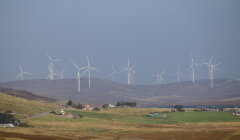Letters / Ofgem has failed Shetlanders
Ofgem was created to protect consumers from the effects of privatisation. However, electricity prices, having fallen between 1991-2003, have since doubled.
Shetland’s fuel poverty stands at 53 per cent (SIC 2016), against 25 per cent in Scotland and 10 per cent in England. There is no public gas supply and hence, no serious competition for electricity and oil. Energy is needlessly expensive in its cold, northern climate.
Ironically, billions of pounds worth of low-cost gas is pumped ashore in Shetland, for consumption elsewhere. Not a single molecule has found its way to a local consumer.
It makes no sense. The heavy subsidy of Shetland’s electricity by mainland consumers would be substantially reduced if gas supplies were available for electricity generation and general use.
Ofgem’s website states:
“Our principal duty is to protect the interests of…consumers. This…obliges us to evaluate almost any situation or proposed change through the lens of energy consumers.”
And, referring to gas:
“1.6 … (Ofgem)…must have regard to: the need to secure that… all reasonable demands in Great Britain for gas conveyed through pipes are met.”
The proposal by Danish power specialist BWSC to import LNG (liquefied natural gas) to supply a gas-fired power station could also provide low-cost gas for general use via pipes and road tankers or for district heating schemes.
Ofgem has failed in its “principal duty” to Shetlanders and its “minded-to approve” decision on SSEN’s grid link threatens to make this lamentable situation permanent.
Following rejection of several, high cost proposals SSEN unveiled its piece de resistance, a tenfold overcapacity grid link and giant wind farm, plus essential standby power station, totalling around £1.3 billion; a sledgehammer to crack a nut.
If a grid link is needed to supply oil companies’ production power then they must contribute to the link cost and the energy supplied must be subsidy-free. Otherwise, consumers will be subsidising fossil fuel extraction.
Become a member of Shetland News
There remain serious questions about subsea cable reliability. The Western Link, which transports Scottish renewable energy to England and Wales, was delivered three years late and has been dogged by failures, as recently as last December. Ofgem’s investigation into the fiasco, started in January, is taking a very long time to report.
More worrying, still, are reports of failures in the new (2017) Caithness-Moray subsea cable, on which Shetland wind farms will depend to carry their output onwards from Caithness. It has already suffered faults and at least, one section of cable has been replaced.
With expensive modifications, retaining Lerwick Power Station is apparently the preferred option for standby/backup power to cover cable failure. The scale of expenditure on huge batteries and stabilising devices to ensure a seamless changeover suggests it may be needed to run regularly. And if oil and gas installations are to be supplied, its capacity will be inadequate, meaning yet more expense.
However, BWSC’s no cable, gas-based solution addresses all Shetland’s energy needs and cost-effective decarbonisation. ‘Carbon-neutral’ LNG is available now and other carbon-neutral fuels can also be used when they come on sale. The entire installation would cost less than one tenth of SSEN’s mammoth boondoggle.
Astonishingly, there has been no in-depth analysis to justify the expense of a grid link. National Grid’s purported “cost-benefit analysis” did not assess that. It stated:
“The report does not assess whether a connection to the islands is in the economic interest of the GB consumer and only compares the economic benefit of each connection option, relative to each other.”
Yet Ofgem is “minded-to approve” the £632 million project without any such reassurance.
If consumers’ interests include “reducing greenhouse gases”, then it is surely Ofgem’s duty to ensure that it happens, cost-effectively. Not simply waving through the most expensive, overkill solutions promoted by subsidy-farming capitalists.
If it is genuinely “evaluating…(this)…proposed change through the lens of energy consumers”, Ofgem must surely reconsider its position and instruct a rigorous, independent analysis of these alternatives before committing consumers to such colossal expenditure.
John Tulloch
Arrochar
References:
- “Our principal duty is to protect the interests of…consumers. This…obliges us to evaluate almost any situation or proposed change through the lens of energy consumers.”
https://www.ofgem.gov.uk/about-us/our-priorities-and-objectives
- “1.6 … (Ofgem)…must have regard to: the need to secure that… all reasonable demands in Great Britain for gas conveyed through pipes are met.”
- Caithness-Moray Inter-connector Faults
http://marine.gov.scot/sites/default/files/environmental_appraisal_-_redacted_0.pdf
- National Grid Cost-benefit Analysis
https://www.ofgem.gov.uk/system/files/docs/2020/04/shetland_isles_cba_report_april_2020_redacted.pdf
Become a member of Shetland News
Shetland News is asking its many readers to consider paying for membership to get additional features and services: -
- Remove non-local ads;
- Bookmark posts to read later;
- Exclusive curated weekly newsletter;
- Hide membership messages;
- Comments open for discussion.
If you appreciate what we do and feel strongly about impartial local journalism, then please become a member of Shetland News by either making a single payment, or setting up a monthly, quarterly or yearly subscription.












































































